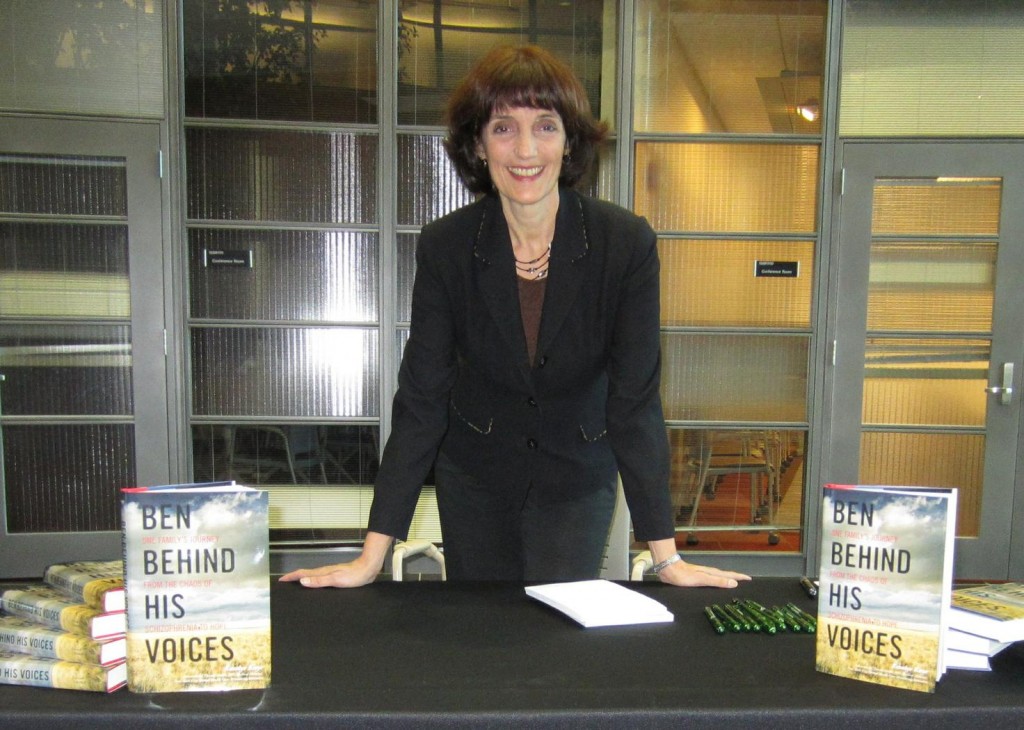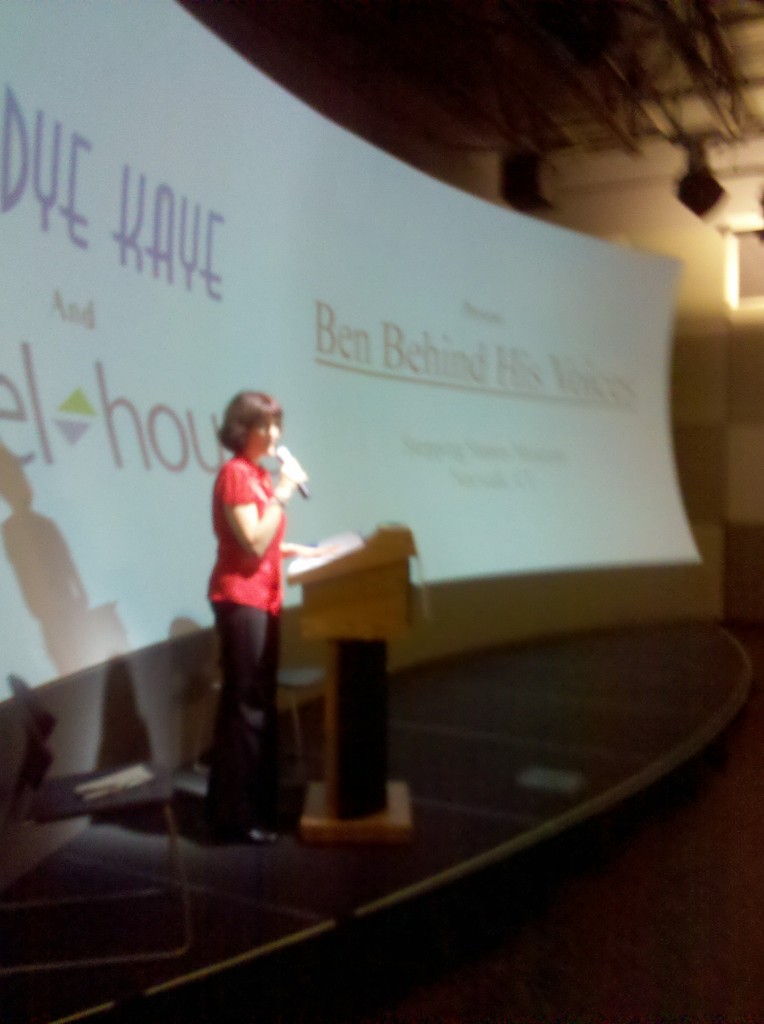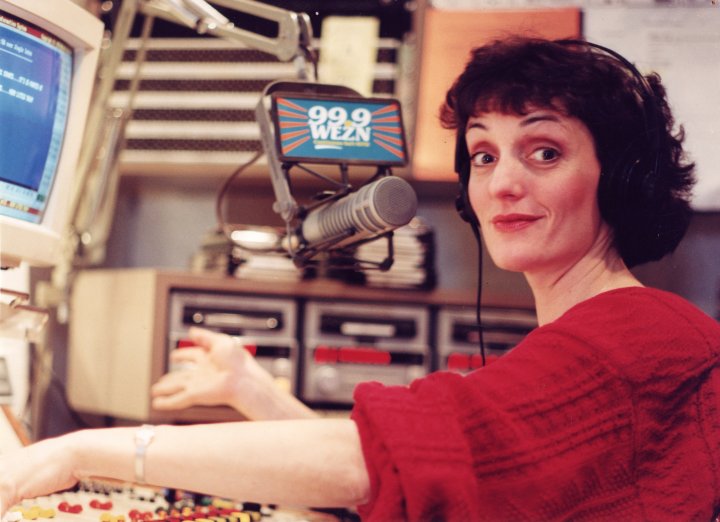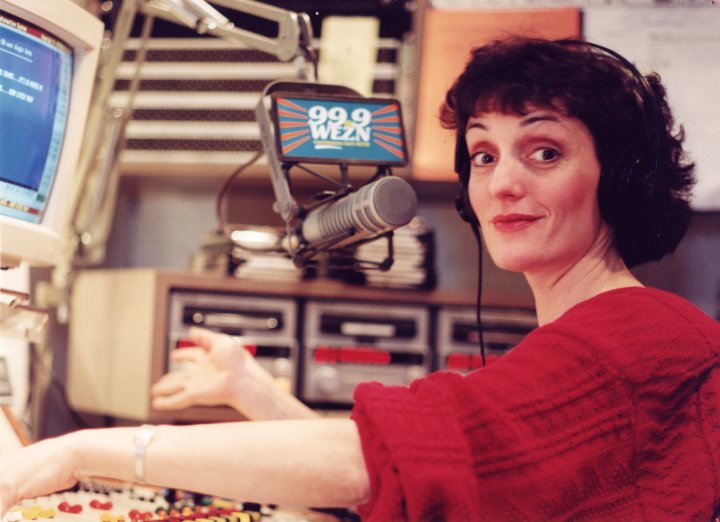Randy Kaye is an American voice-over actress with a prolific career in communication. This is our interview on her views about the challenges of being a voice talent and getting the message across to the audience.
Podcast: Play in new window | Download
Constantino: Randye, you are more than a voice artist, you are a real communicator, you write books and teach about presentation skills for example. Tell us something more about your career?
Randye: I began with a desire to be a Broadway star, glee was me and I also went… I learned guitar, I did song writing, I sang folk songs, I lived in New York for 4 years, LA for 4 years and I did a smothering of acting on stage, on TV, on film and then I really decided it was important to have an offstage life as well. So I got married, got pregnant and friends suggested I get into voice over as well while I was pregnant and I thought… great.
So I went to the process: coaching demo, looking for clients and never look back. It’s always been part of my career. That baby is now 31 years old, so I know I’ve been doing voice overs for 31 years and at times it’s been back burner. I wrote a book and that showed me that you can mix writing and voice-over pretty well. In promoting the book, I had to put voice over on the back burner which basically means no marketing to new clients. So I put it sort of back burner while promoting the book was front burner and currently voiceover is my bread and butter, that’s how I pay my bills and to kind of support that I still do. I coach for Edge Studio in New York and Connecticut; they are kind of all over the place now.
I coach for them a little bit for the anti defamation league, about a few times a year I teach school kids about cyber bullying and diversity and sometimes go into corporations. I do some speaking on behalf of the book which is about advocating for those with mental illness issues and their families and I do theater and I sing and it all kind of… it creates a career, I find out that the more that I do, the more interesting I become and you can bring that into voice-over.
Constantino: So you are like a Swiss knife of communications because you have so many skills related.. Communicating to other people through different media and voice talent, but also actress and so many things. Talking about your work as a trainer, as a coach, do you have maybe some tips handy for voice talents… voice talents that are experienced and maybe they don’t know some certain things they should apply to improve their skills?
Randye: All of my friends that are working voice talents, they know a few things which is first of all it’s a business and if you’re an experienced voice talent you know that some things do sometimes fall into your lap if you’re just good on what you do and you keep out there and you do it. But you need to know when you need to put the extra effort. Most of my friends know… look there are days that come and no jobs come in and those are the days you spend marketing. So yeah, obviously keep the business flowing, keep those arteries clear.

I also attend a VO conference the FaffCon in the United States which is an Un-conference for professional voice-over talents and we gather and you know, drink and eat, but we also teach each other and it’s a fascinating thing and every time I go I learn something new from the fellow voice talent.
And among those things are… you know, So I always say:
- Keep learning: it’s one of the most fun parts of the VO business.
- Keeping fresh, using social media to keep in touch with your customers.
- Learn new skills, new talents, new ways to use the home studio.
I just attended a workshop with Joe Cipriano who’s a great promo voice in the States and you know, I go to a class to learn, of course, we never stop learning; we never stop trying to get better, so definitely keep learning, keep working your business plan. I love that you have to kind of know what your strengths are. So I know what my voice is, I know what I’m most likely to get cast in. That doesn’t mean I’m not going to try out for those other things if I think I might have an interesting twist. But it’s a constant process in voice over as it is in life to keep rediscovering yourself. Who am I? What can I do next? So my goal for this year is to get deeper into radio imaging and promos which I absolutely love. I know I’m very castable in medical and E-learning and retirement community advertisements and yeah so you know what you’re good at but see if it’s expanding.
Constantino: Yeah, that’s the… tricky part because There are so much competition out there and many talents chasing well more and more jobs. The market has expanded due to the new media etc, but still it’s not easy to find your niche even if you are an experienced talent. So what does it take to really succeed to earn a living out of the voice over business?
Randye: I have this… right by my desk and it says, “Run your own race” And this inspires me because it’s very easy to get into this… well this talent book that… especially if you go on Facebook and people… I don’t want to call it bragging, but they are excited and they post their latest jobs, and you know sometimes I do it. I put it into my Facebook page so that if the perspective clients want to know what I’ve done, they can go to my page and see that I’m working and look if I got booked to be the voice of CBS, I would probably put it on Facebook. But I try not to do it too much, and I try not to compare because if you go on Facebook and someone says, “Oh I just booked my 50th audio book”, and you’re not running your own race and you’re trying to race against them, it’s very distracting.
So run your own race, do your own personal best, know what you like to do and what you don’t like to do. We’re all human and if they won an awards for an audio book, part of me will get jealous and then part of me it’s like, wait a minute I don’t love doing audio books, I’ve done some. But for me, that’s a back burner genre. So why would I be jealous of that? So I have to kind of talk myself out of that and say, “You know what Randye, what you’re really… what you love to do, pursue that.”
So the goal is to stay as good as you can, run your own race, you keep exploring other tracks, but just service your clients really well and care about them and care that the listener gets that message whether it’s how to be an open fire burning official in Connecticut 300 page tutorial or whether it’s a 30 second commercial telling them how great this new foundation is.
If you care about your listener and you care about your client and you run your own race, you can avoid that, “Why would they hire me? There are so many other people out here?” So, there’s no one like you. But if you’re not good at what you do, nobody cares.

Constantino: Absolutely, the niche is your uniqueness, the fact that you just have your voice and nobody else has your voice and skills. But for those outsiders, and those newbies, the beginners also, we have to try something that is obviously now we’re on a profession that a nice sounding voice is not enough to really succeed. You have all the skills, experience and actually the marketing as well. And at this very moment that there’s the new media, yeah we have to have the commercial side, the marketing side. So I guess that’s something that we shouldn’t forget that we have to promote ourselves. So here from the European perspective, it’s hard to do. Because people are not used to selling themselves as related to customer in the United States that you know, more commercial aspect. So how important is marketing and that commercial side of a voice talent to really succeed in this profession?
Randye: Yes, we Americans are a little louder. You know, like, “Here I am!” But you know, it’s not easy for us either. We never want to sell ourselves and I’d like to think of myself as a service people.
I would do terrible on commission if I were in a store or we’ll just put it… let me help you, let me help you and I know that about myself. So I try to think of marketing as helping the client find somebody without having to go through a lot of effort. But it’s frightening, you know, that called… you know, “why didn’t you hire me?”. So it’s… is it important? Absolutely, I tell my new students that this is… you must… before you make your demo, you must be thinking about marketing from the very beginning.
Take longer before you record your demo, so that you can find out what you enjoy doing because if it’s on your demo you better be so good at if that if you get a job tomorrow, you’re going to make that customer into a regular client. And that takes a process. So figure out what you want, figure out who you’re going to market to. If you completed your demo, you should already have begun your marketing by having a list of perspective clients and you only have to look to your first demo to see who you’re going to market to.
And then as you progress in your career, see who’s hiring you and who’s not hiring you and your niche maybe come clear. If people hire you again, then you’re good at that. It is not, you know my talent here and my marketing here, it’s together because you’ll figure out what you’re good at, what your strengths are and the more classes you take even when you’re up and working or the more you network with other people or go to work out groups, you’ll discover new niches. So marketing is essential, so is home studio skills. That didn’t used to be true.
Constantino: Yes, Randye talking a little bit more about what makes the difference in this business is not just about the voice, probably there are many other ingredients, we just mentioned the marketing. But also, yeah you need to have some presentation skills and you know a lot about that. But there is a paradox that some people who even experienced excellent voice talents, they are very good of course, actually reading a script, but when it comes to presenting to be in front of an audience for instance, they are not at ease. So there’s a kind of paradox. Of course there are 2 different skills or jobs there. But I think… sometimes they are connected, sometimes voice talents are asked to present… to sound as if they are presenting in front of an audience. Can you explain this kind of paradox?

Randye: Yes, you’re right. It is a paradox of sorts and they are separate but related things. I always tell people that you know we learn to speak because we want a result and we use our face, we use our body and almost every culture uses their hands unless it’s considered rude and it’s kind of frowning the part and you learned not to use your hand so much.
And 99 times out of a hundred audiences are audiences of one. Unless you’re doing a voice over that is meant for a group like if I do an award show and it’s going to be like and the Emmy awards goes to you know s were doing a big announcer kind of read or a movie trailer, anything that’s going to be played in a group, you can have that big presentation on read. But most of the voice over’s your doing are listened to by that person alone in their car or that person alone at their computer taking the online training or an audio book that’s in ear buds.
So you need to be much more intimate in voice-over than you do when you’re presenting to a crowd. The other differences of course is that when your presenting to a crowd hopefully you are not just reading from a page although some people do that, they write a speech and they present it. So writing a speech and presenting it can be very similar skills to voice over except that you just need to be bigger there’s a… maybe a thousand people in the audience.
But when you’re doing a presentation from an outline there’s a lot of improv that goes on. You need to really relate to your audience and care about them and allow that communication to happen, but you still need to be free with those gestures, you need to be yourself. So there are elements of improv in voice over depending on the project. But when your reading from the page, I sometimes coach people to do that and you still to do similar things, you have to find your keywords, know what point you’re making, know where the copy is going, know what story your telling so that you’re not just reading because we learn to read very left brain it’s one word at a time and it’s awful.
You know, you know when someone’s reading and they don’t know what they’re saying so I either way presenting from a written script or voice-overing from a written script, you need to know the story you are telling whether you wrote it yourself or whether someone wrote it for you.
Constantino: Body language when it comes to reading on the mic I mean… just a script to the voice over in the booth. How important it is also to use some kind of body language? Because we’ve been told all the time by producers well you have to smile while you read to, that’s true there’s an effect when you smile. You don’t see but you can hear the smile sort of. I guess the rest of the body, if you use your body also when you are sitting down or just standing whatever you are reading. I guess there is also some extras, some added value there, right?
Randye: You know I have to say that there are rare exceptions. But almost every voice talent I know who… you have to take the written script which somebody else wrote and it’s often in the narration field and language that is nothing like the way we would speak. It is written for the eyeballs, it’s not written for the ear so there are commas and semi-colons and you know it looks great to the eye, it separates ideas but it’s not the way we speak and there are degrees casual.
You know and their hands go all over the place because they’re not aware of it. We really can’t communicate well without using our bodies. If you look at a child communicate, they don’t just stand there like this and go, “dear daddy I would like a cookie.” You know it… we use our face if you raise you eyebrow it’s going to change your read. If you widen your eyes look what just happened to my voice, I just said Randye widen your eyes and it came out breath… and you know enticing.
But facial language and body language changes everything and it also makes you more aware so that you’re not focused on your voice all the time and judging yourself, it brings the energy outward to the listener. Now I do know… I have some voice talents I’ve worked with who you know put their hands in their pockets the whole time but their face is very active and that’s just who they are. I’m a real hands person, now if I’m on camera I need to be aware of my gestures and make them much less because they are very distracting.

But in voice over there’s the freedom of so much body language, I can look as ugly as I want, I can make the ugly witch face if I do a witch. You know so I don’t have to worry about the camera which I love so there is always that little bit of awareness but if you’re not using your body language it means your stressed and you can feel it in your shoulders and you can feel it in your neck and your voice is going to sound as stressed and tensed as your body is.
Constantino: So the advice is yes, use that body language. Move your hands as long as of course you don’t make noise or… because the mic could pick it up, but that’s obvious.So you said Randy attitudes, feelings and emotions, body language they are important to do this job right. But how can you do when you are sometimes on your own, when you are alone in your home studio without any feedback?
Randye: Attend as many workshops as you can, don’t get rusty. So while you’re alone in the booth, listen to yourself to know why you didn’t hit the microphone, so that you know you didn’t say the word right, so that you know that if that doesn’t sound right.
And have the freedom to… let that director to be there but don’t let that be a harsh judge and give the client what they want and also I would say before you get in the booth to record, communicate with your client as much as you can and say, “there’s a couple of ways I could approach this copy.”
I’ll send a casting director 2 test reads and say which tone would you prefer and sometimes they don’t pick the one I thought they were going to pick. So have an idea of what you want to do and do your best and when you’re listening back, put your director hat on and if there’s a sentence that you don’t believe or it’s just… I didn’t say you know. Then go back and record that sentence.
Constantino: Yeah, and the feedback can be immediate if you have the privilege as you said of having a director or producer client there in your studio or just I mean the feedback could come later you know because you send your mp3 just to… for your client to test and then you get the answer back maybe in an hour or 2. So it comes to the same thing you need that feedback because you don’t know you’re doing right or not. Anyway, in your books Randye you are a promoter of positive thoughts we know that…everybody knows that it’s very positive very good for life in general. But how important it is when it comes to recording a voice over?
Randye: Wow that’s a really interesting question. You know I have written 1 book and it is really about my family’s resilience and my son’s resilience with his severe mental illness of schizophrenia and you know our journey from chaos to hope but yes, positive thought has been a great healer for me in any situation of adversity. So when I write of a… I had a radio show and stuff, we do talk about positive thought on the way it ties into my voice over careers I believe that words have power.
Because we’ve heard them our whole lives, we associate words with different feelings. So for instance if you call someone stupid or you call yourself stupid, that’s much harsher than calling yourself silly. It’s like, “Oh silly, I may have made that mistake again. It’s much gentler and sweeter to yourself that saying, “that was stupid.” I mean that makes my body tense up after hearing that word.
So, know that language has such power, the way we speak to others, the way we speak to ourselves and we’re often most harsh on ourselves. So I don’t like books on happiness that take 300 pages to read, it’s just like… it’s not that complicated, you know. So I just talk about word swaps. So if you say, “Oh I have to do that project today”, you’re not going to go into the booth with a very positive attitude. If you change “have to” to “get to”, “Oh I get to do that project today.” That is so much more powerful. Just that word swap puts you in a place of gratitude.
I feel so privileged when somebody entrust their script to me, to allow my voice the privilege to bringing it to life. If you ever say, “Oh this is boring.” You are not going to do that client any justice, and you know, I’ll bring up again that 300 page… E-learning that I did on how to be an open fire burning official in the state of Connecticut.
Now, I was so privilege to share that with the fellow voice talents back and forth, but it had to be in legal language, spare free, worthy. I happen to like words, so if I were to start judging that as boring, you know what? It’s not boring to my listener.
The listener needs that information, so tell yourself, I’m redoing important stuff here, it’s important to the person whose listening and that word swap that has a positive thought too. Don’t judge your copy, do the best with your copy and when you get the privilege of being in a booth, sure you get tired, you may need a break. It’s hard work, but we are so lucky to have it. So positive thought and one more trick I used, if I audition for stuff and I don’t get it which at least 19 times out of 20 that’s what’s going to be the case, I always say “Oh I must have come in second.”
Constantino: Yeah, I mean this is to sum it up, it’s not about the voice only, it’s about attitudes, about emotions, about your body language we mentioned and that’s very important too because we have to add something of ourselves into a script, any script and that’s very important and you have to keep that feeling all along your career. I mean, in my case, 25 years doing this and this is still an excitement and I try to be positive, even when sometimes you have in front of your eyes a script that is thoroughly poorly written or there are some things that are not… you know, nicely put, whatever. Of course, that’s the nature of the text that you may do something to improve it, but to really… to convey the… well I mean, the thoughts and the feelings there, well that’s why you’re hired. So that’s… we should actually stress that point. You’re hired to express the thoughts and feelings of a text.
Check out Randye website here , as well as her profile on DirectVoices
